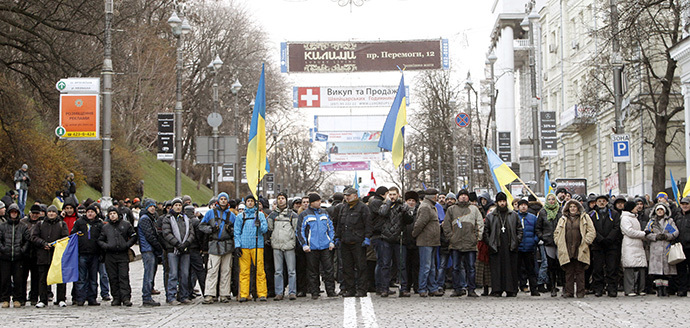World powers sought to ease tensions over Ukraine Tuesday as the country’s makeshift government grappled with the threat of economic collapse and separatism after the dramatic ouster of pro-Moscow leader Viktor Yanukovych.
World powers sought to ease tensions over Ukraine Tuesday as the country's makeshift government grappled with the threat of economic collapse and separatism after the dramatic ouster of pro-Moscow leader Viktor Yanukovych.
Russia softened its angry tone over the sudden, weekend regime change in Ukraine, while EU foreign policy chief Catherine Ashton paid a visit to the ex-Soviet country that Yanukovych had tried to steer towards Moscow but whose new, interim leaders have tilted firmly towards the West.
Furious talks took place between US, European and Russian diplomats as the country appealed for $35 billion (25 billion euros) in aid to avoid bankruptcy and interim leader Oleksandr Turchynov warned of a secessionist threat.
"In several regions of Ukraine there are very dangerous signs of separatism," Turchynov told parliament on Tuesday, voicing fears that the pro-Russia east could agitate for partition after a pro-Western administration took charge of the country following months of anti-Yanukovych protests.
Russia had initially reacted with fury to the weekend's rapid-fire political changes -- brought about by last week's clashes that left nearly 100 dead -- accusing the new leadership of waging an "armed mutiny".
But on Tuesday Russian Foreign Minister Sergei Lavrov sought to soften the tone, saying Ukraine should not be forced to choose between Russia and the West.
"We confirmed our principled position of non-intervention in Ukraine's internal affairs," Lavrov said in Moscow.
"We are interested in Ukraine being part of the European family, in all senses of the word," he said. "It is dangerous and counterproductive to force Ukraine into a choice."
Ashton also sought to ease tensions on her trip to Kiev.
"We offer support, not interference for the future," Ashton told reporters in a bid to discredit claims that the West wants to bring Ukraine into its sphere of influence.
She also stressed "the importance of the strong links between Ukraine and Russia and the importance of having them maintained".
The tumultuous events of the past week have capped more than three months of relentless protests against Yanukovych's rule sparked by his November decision to spurn an historic pact with the European Union in favour of closer ties with Russia.
One of the stars to emerge during this unrest was Vitali Klitschko, a heavyweight world champion boxer who became one of the three major protest leaders.
The tall 42-year-old has managed to use his sporting credentials to bridge traditional divides in Ukraine between the more nationalist West and pro-Russia East and South, and as such enjoys wide popularity.
Klitschko announced Tuesday he would stand for president in polls set for May 25, shortly after the electoral commission officially kicked off the campaign for elections.
Candidates have until March 30 to put their names forward, and so far, only the pro-Russia governor of Kharkiv, a region in the east, has also announced his candidacy.
And while Ukraine's opposition-dominated parliament on Tuesday delayed the highly-anticipated formation of a new government until Thursday, it voted to apply to the International Criminal Court to prosecute Yanukovych over the "mass murder" of protesters.
Yanukovych, however, has disappeared since he reportedly attempted to flee the country on Saturday from the eastern city of Donetsk.
The new government will face the tough task of maintaining financial and territorial stability in Ukraine ahead of the May polls, amid concerns over separatist tendencies in Russian-speaking areas of the east and south.
On Sunday, thousands of people rallied in the southern port city of Sevastopol -- home to Russia's Black Sea fleet for some 200 years and a bastion of pro-Moscow sentiment -- calling for "Mother Russia" to save them.
Russia's foreign ministry on Monday slammed the new leadership for setting a course "to suppress those who do not agree in various regions of Ukraine using dictatorial and sometimes even terrorist methods".
Others in Western countries have also expressed concern that Ukraine could splinter into rival pro-Russia and pro-EU camps, and over potential economic collapse.
"We have to avoid civil war, we have to avoid financial and economic collapse of the country," said Evangelos Venizelos, foreign minister of Greece, which holds the rotating EU presidency.
Deputy Secretary of State William Burns was due in Kiev on Tuesday, and British Foreign Secretary William Hague held talks in Washington with US Secretary of State John Kerry and the International Monetary Fund. He is due to visit Ukraine soon.
Russia's displeasure at the changes convulsing its neighbour has translated into fears that a much-needed $15-billion bailout from Moscow announced in December may be abandoned after only one payment of $3 billion came through.
Ukraine's interim finance minister Yuriy Kolobov said the "planned volume of macroeconomic assistance for Ukraine may reach around $35 billion" by the end of next year, and called for an international donors conference.
Ashton however offered no concrete commitments of economic assistance on Tuesday, saying only that the International Monetary Fund was "very keen" to meet the future new government.
